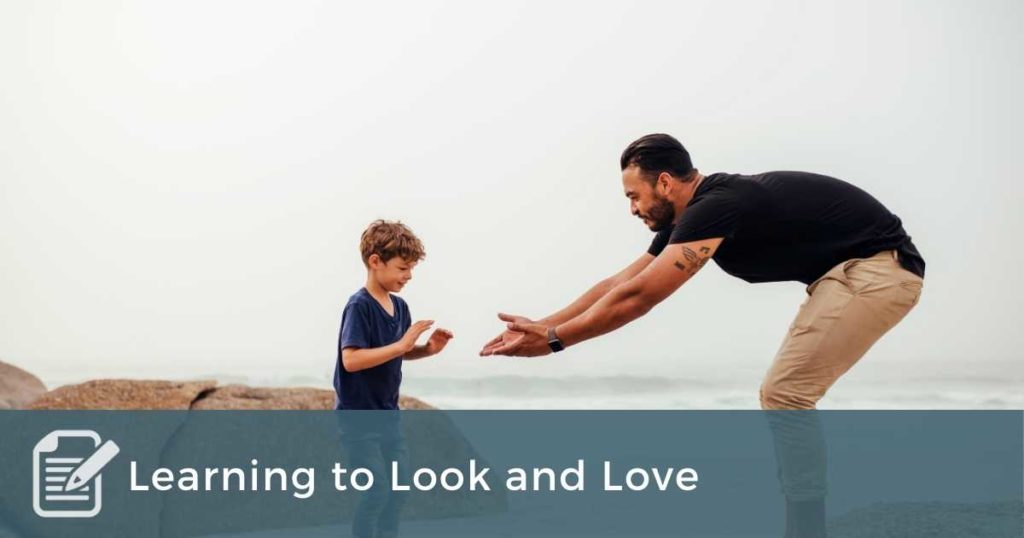“Jesus looked at him and loved him.” (Mark 10:21)
My High School sports coach almost always looked at me with contempt. Jesus was about to ask this rich young man to flip his life upside down, but before he makes his observation, he looks at the man, and any observer of the scene could tell that Jesus loved him.
Jesus looked at this eager, intelligent, promising, resourced young man and thought to himself:
“This boy has it in him. He has it in him to follow my ways and eventually, to do what I do.”
Yes, this young man needed the saving blood of Jesus Christ to atone for his sins, but Jesus was carrying that blood in his veins and knew that wouldn’t be the problem.
The problem would be moving the man from where he was to where Jesus wanted him to go. And don’t miss this, even Jesus doesn’t have perfect success with this.
As Jesus began a conversation to draw out the God-purpose in this man’s life, he starts by establishing a powerful presence with him. There is no more powerful presence than love, and there is no more powerful person than Jesus.
When I am preparing to draw out the God-purpose in my client’s life, I should certainly start the same way Jesus started. I should look at my client and love him (or her). I should think to myself:
“God has created this person with an eternal purpose. An epic story is already known about this person who will live forever in the greatest Kingdom the creation will ever know. This is a person that God wants in His city, in His presence, until a time I can’t even imagine.”
I am going to ask my client to perform at the edges of their potential, and it will take more than a challenge or even clarity to bring out their absolute best.
The Coaching Presence As Defined by 1 Corinthians 13
If I speak in the tongues of men or of angels, but do not have love, I am only a resounding gong or a clanging symbol. – 1 Corinthians 13:1
Paul goes on to say in this classic text that if you can fathom all mysteries or can move mountains with your words or make the greatest of sacrifices, you have changed nothing if you don’t start with love. Paul reiterates Jesus’ position that to have any impact at all on the world, especially on people, you have to start by loving that person, by believing in the goodness of having that person in your circles.
Let’s start working through Paul’s description of love and apply it to our own coaching presence.
1. Love is patient.
Love is patient, love is kind. It does not envy, it does not boast, it is not proud. – 1 Corinthians 13:4
Let me tell you what I don’t love. I hate to use the word hate, but… I hate it when a client forgets an appointment. I’m ready for the appointment. I’m waiting for the call, or worse, I’m waiting at the table at the coffee shop, and first, it’s five minutes, then ten. How long do you wait before sending a text?
Most clients feel bad, but a few don’t, and I have to make a conscious decision about my coaching presence at that point. I have to decide to love my client.
Love is patient. Love is kind. You have a few choices about how to draw your client into remembering their appointment.
My mentor, Bill Copper, warned me not to do it, but when one client missed an early morning Saturday appointment, I texted him. He was sorry. He had simply forgotten. I felt compelled to send him a text that explained that my policy is to charge for the session if the client doesn’t give me any notice. He texted back, “Well, if that’s your policy, then that’s what you have to do.” Our relationship was never the same.
Bill told me it was ok to charge him for the missed session, but told me not to bring it to their attention. I needed to let them know they missed a session, but I didn’t need to rub the insult in their face. He was right.
The second option is to become a reminder machine. I’ve started to do this more and more, particularly with very busy executive type leaders. You would think their calendars would be laser focused at that level, but they are typically being hit with one fire after another. Being proactive is something they want, but it isn’t built into their system. So the day before, I send these clients a text reminding them of our upcoming session. Often, they text me back and say they need to reschedule.
The third option is to become a person that they can’t imagine missing a conversation with. Would you put Jesus off after he looked at you and loved you? I wouldn’t. I know I’m a better person after hanging out with Jesus. Jesus believes in me. Jesus wants me to succeed.
The coaching presence is patient and kind. Love slows down the conversation. Love makes a bigger room than is necessary for the client to leave with an action step. Love is generous with encouragement. Love hopes the client will have more than I have. Love won’t take credit for the client’s success. Love will help me play my role.
2. Love is not judgmental.
Love does not dishonor others, it is not self-seeking, it is not easily angered, it keeps no record of wrongs. – 1 Corinthians 13:5
A question that always comes up in discussions about coaching is what if they want to go somewhere that you know is morally wrong? I used to try and answer that question, but the last time it came up, I responded, “That’s never happened to me. I’m not going to answer that question until it does.”
Immorality is a very shallow train of thought. A coach who loves the client doesn’t spend much time in the shallow part of the pool. In fact, when Jesus was talking to the rich young man (Mark 10), He quickly shoved the man into deep end. The man had to contend with the fact that most of his thinking was that he liked being rich.
It is very easy for me to be judgmental if I’m coaching the problem. A coach who loves the client coaches the person. The question isn’t “Why did you overlook that key ingredient when you tried to solve this problem?” The question is “How can you get a fuller of view of what needs to happen next time you run into this problem?”
Love creates an environment where the client is safe enough to take responsibility for her situation. Love doesn’t blame other people. Love never assumes that mistakes will ruin us. Love never holds a grudge. A good coaching presence can help the client move on emotionally.
3. Love is optimistic.
Love always protects, always trusts, always hopes, always perseveres. – 1 Corinthians 13:7
I can’t seem to retell the story very well, but I was listening to a TV preacher (see # 2 – Love is not judgmental – if you just judged me), and he was talking about the man who came out his front door and found horse manure on his front step. The pessimistic man shouts, “Who put horse manure on my step?” The optimistic man exclaims, “Someone must have brought me a horse!”
The deep side of being optimistic is that a good coach will tell their client the difficult truth.
-
“Pastor, you’re treating your elder like the enemy.”
-
“You’re moving too fast and missing some key steps.”
-
“You seem to have a habit of going alone instead of building a team.”
Love protects confidentiality. Love predicts success. Love never gives up in the face of failure. I’m learning about my own strengths. My top four Clifton Strength Finder strengths are strategic. But the last one, coming in at number five is different. My fifth strength is Belief. I’ve joked for years that I’d rather have Woo. But let me tell you about Belief. I have no doubts about the future, mine or yours. As a coach, I can believe in you enough for the both of us.
I am a powerful coach just by showing up. I can ask great questions, and I can help you create a great action step. I can listen at a very deep level, but before I do any of this, you should be able to feel the fact that I already believe in you.
4. Love creates maturity.
When I was a child, I talked like a child, I thought like a child, I reasoned like a child. When I became a man, I put the ways of childhood behind me. – 1 Corinthians 13:11
Look at the result of love – maturity. Paul goes on to say that the signature trait of maturity is that you can be fully known. As a coach, don’t be afraid to let yourself be fully known. If you approach your coaching relationships with love, it will cover over a multitude of failures with your skills.
Which one of these areas needs to improve in your coaching presence? Send me a short note and let me know.




